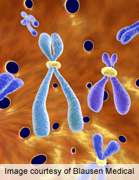KRAS mutations predict shorter survival in lung cancer

(HealthDay) -- For patients with advanced lung adenocarcinomas, KRAS mutations predict shorter survival, according to a study published online July 18 in Cancer.
Melissa L. Johnson, M.D., from Northwestern University in Chicago, and colleagues examined the prognostic significance of KRAS mutations using data from 1,036 patients (59 percent women; 33 percent never-smokers) with advanced lung adenocarcinomas with known EGFR and KRAS status, who were evaluated between 2002 and 2009.
The researchers found that the patients had a median age of 65 years, and 81 percent had a Karnofsky performance status of 80 percent or greater. EGFR mutations correlated with longer overall survival (hazard ratio, 0.60; P < 0.001) and KRAS mutations with shorter survival (hazard ratio, 1.21; P = 0.048), in multivariate analysis.
"In conclusion, we report here that the presence of a KRAS mutation is a poor prognostic factor for patients with lung adenocarcinomas," the authors write. "Because patients with KRAS mutations have a distinct clinical course that results in shorter survival, they should be evaluated separately in clinical trials. We recommend including KRAS testing in upfront mutation analyses along with testing for EGFR mutations and EML4-ALK to prospectively identify these patients in the clinic."
Several authors disclosed financial ties to pharmaceutical companies.
More information:
Abstract
Full Text (subscription or payment may be required)
Copyright © 2012 HealthDay. All rights reserved.















